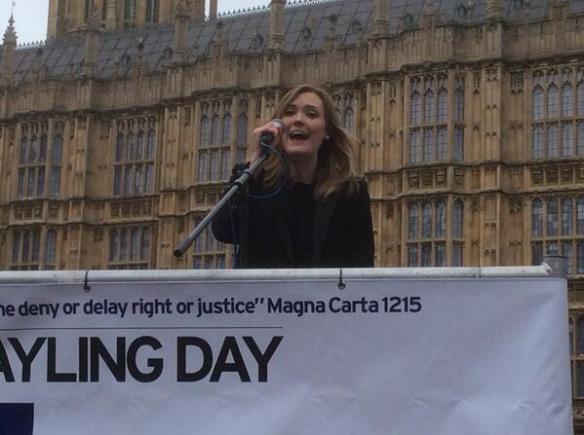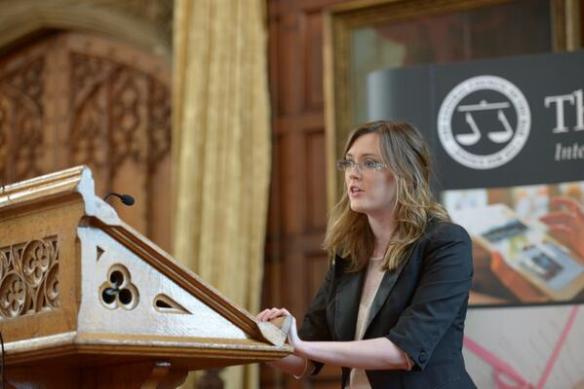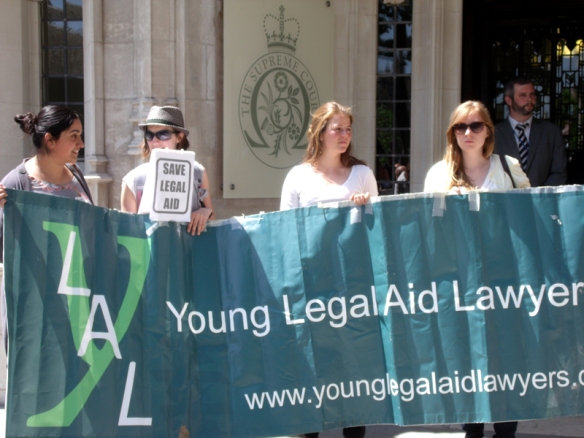Last week marked one year since the Legal Aid, Sentencing and Punishment of Offenders Act came into force. Hannah Evans, junior barrister at 23 Essex Street, writes for Legal Aid Watch on how legal aid reform has hit young lawyers like herself.
Under this government there have been a number of cuts to legal aid, with further cuts due. Civil and family legal aid was dealt a blow with the introduction of the Legal Aid, Sentencing and Punishment of Offenders Act (LASPO) and criminal legal aid has very recently taken a hit too, with more cuts planned for next year.
The impact of these cuts on the public is clear: access to justice is severely curtailed.
Without a proper system of legal aid we end up with a two-tier system where one’s ability to obtain justice is determined by whether one can pay for it.
But what about the consequences of legal aid reform for young lawyers – specifically young barristers – who wish to do publicly funded work? Cuts to the legal budget mean, quite simply, cuts to the fees they can expect to earn.
“The impact of these cuts on the public is clear: access to justice is severely curtailed.”
Take the most junior criminal barristers, for example. For our work in the Magistrates’ Courts – which is where we hone our skills at the beginning of our careers – we are paid a share of the fee our instructing solicitor receives for a case. It should be quite obvious that if a solicitor is paid less for a case, a junior counsel’s cut will be less too.
That’s assuming that we can get instruction, of course. Quite understandably, solicitors may feel they are unable to brief counsel because it’s simply not economically viable. The effect of all of this is that junior barristers are unable to establish their practice.
In other areas of law, LASPO has had a hugely damaging effect on young barristers (not to mention a devastating effect on many members of the public). Under the Act, entire areas of law were removed from the scope of the legal aid budget. If junior barristers in those areas of law had a chiefly privately funded practice, they were able to carry on without too much upheaval. But what about those whose practice was, and still is, largely or wholly publicly funded? That’s a very different story.
The above are just examples. What is clear is that for most junior barristers whose practice is largely or wholly publicly funded, it will be a struggle to establish and maintain a practice and we won’t get adequate pay for the work we do. I often cite the example of being paid £80 for a day’s trial in the Magistrates’ Court and all the work that goes with it – and that was before the government’s latest cuts to criminal legal aid were implemented.
“For most junior barristers whose practice is largely or wholly publicly funded, it will be a struggle to establish and maintain a practice.”
If a junior barrister has a private source of income – parents or a partner who can assist, for example – they’ll be able to carry on at the Bar if they wish. But for those of us without such a fallback, we have to seriously consider our position. Can we afford to stay? For many, the answer is “no”, with the result that the Bar loses many talented and dedicated individuals. The Bar as a whole becomes less diverse as only those with private income are able to stay, and far less representative of the public it represents.
Make no mistake, it is the same public that suffers. Not only will excellent barristers leave the publicly-funded Bar, many capable lawyers will never arrive at all.
“Can we afford to stay? For many, the answer is “no”, with the result that the Bar loses many talented and dedicated individuals.”
From the outset, they may decide that it’s not worth entering a profession where the work is challenging, the hours long and the pay derisory. Who can blame them? Many of them are struggling with debts worth tens of thousands of pounds. They’ll choose more lucrative careers and, again, the public will lose out.
For those who try to make it to the Bar, their task will be all the harder. If junior barristers are earning less, their financial contribution to chambers will inevitably be lower. Remember, the impact of cuts to legal aid is not limited to the most junior barristers – for example fees for conducting ‘very high cost cases’ in the criminal courts are also being cut – so across the board members of the Bar stand to earn less and therefore pay less into chambers.
If chambers’ funds are diminished, so too are the number of pupillages they are able to offer, if they can offer any in the first place. Some chambers will only be able to offer pupillages with lower awards: the consequence of this is less diversity at the Bar, as those without private means will have to look for alternative career options.
“Some chambers will only be able to offer pupillages with lower awards: the consequence of this is less diversity at the Bar.”
In this way, cuts to legal aid deprive the public – those who can afford to bring their cases to court, that is – of many who would fight fearlessly for justice on their behalf. For those already at the publicly funded Bar, the cuts mean that it is a constant battle to remain there.
Life at the Bar now is more difficult than it has ever been, particularly for the most junior members, and many are struggling. But it is not just junior barristers, it is the justice system, and the public who rely on it, that will lose out in the end. That should alarm us all.



